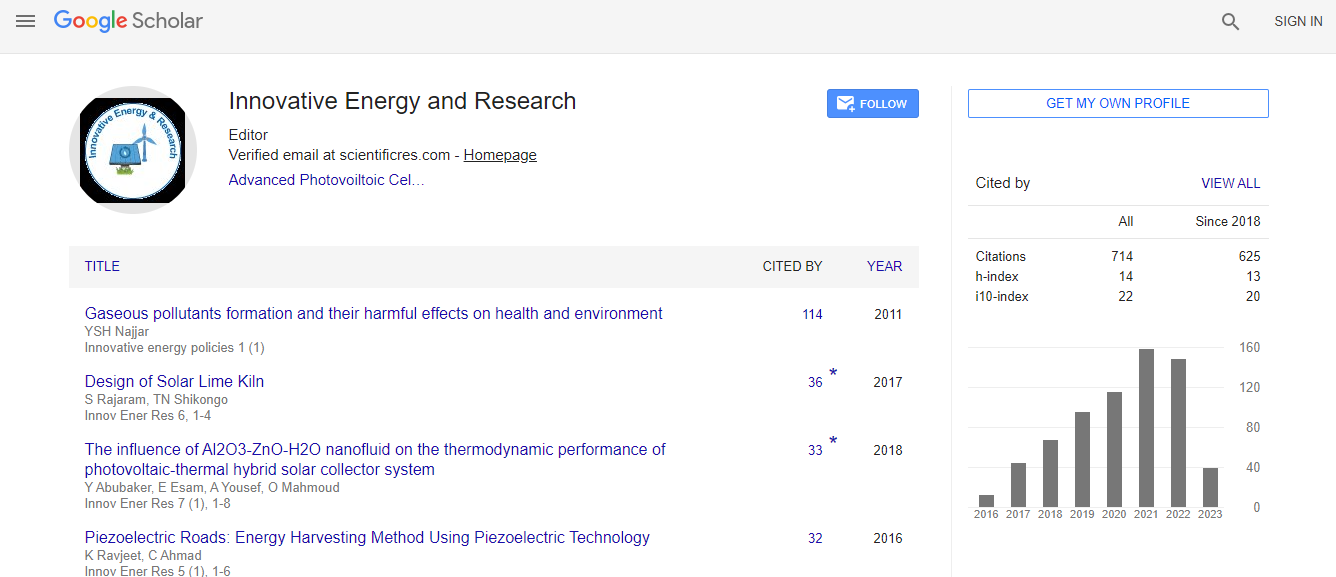Our Group organises 3000+ Global Conferenceseries Events every year across USA, Europe & Asia with support from 1000 more scientific Societies and Publishes 700+ Open Access Journals which contains over 50000 eminent personalities, reputed scientists as editorial board members.
Open Access Journals gaining more Readers and Citations
700 Journals and 15,000,000 Readers Each Journal is getting 25,000+ Readers
Google Scholar citation report
Citations : 712
Innovative Energy & Research received 712 citations as per Google Scholar report
Innovative Energy & Research peer review process verified at publons
Indexed In
- Google Scholar
- Open J Gate
- Genamics JournalSeek
- RefSeek
- Hamdard University
- EBSCO A-Z
- Publons
- Euro Pub
- ICMJE
Useful Links
Recommended Journals
Related Subjects
Share This Page
Thermal properties improvement of column structures formed by nickel nano-materials in paraffin wax
Joint Event on 2nd International Conference on Renewable Energy and Resources & Energy Materials and Fuel Cell Research
Che-Fu Su, Junwei Su, Hamed Esmaeilzadeh, Jirui Wqang, Edward Fratto, Majid Charmchi, Zhiyong Gu and Hongwei Sun
University of Massaschutte Lowell, USA
ScientificTracks Abstracts: Innov Ener Res
Abstract
Enhancing the thermal conductivity of phase change materials (PCMs) is attracting attention for renewable energy applications such as solar, geothermal and wind energy. The use of energy storage can significantly improve the efficiency of renewable energy systems due to their intermittent nature. Latent heat thermal energy storage is a particularly attractive technique due to its high capacity and its ability to store energy at a nearly constant temperature corresponding to the phase transition temperature of the PCM. Among the PCM, paraffin wax has been widely investigated and selected for latent heat thermal energy storage applications due to its characteristics of high latent heat, chemical stability, less super-cooling, noncorrosive, and low vapor pressure. However, most paraffin waxes have an unacceptably low thermal conductivity (e.g. paraffin: ~0.25 W/moC). This has severely limited the application of current PCMs for high power, transient and large scale systems and is one of the major challenges facing energy industries such as renewable energies and waste heat recovery. The present work aims to overcome this undesirable property by manipulating metal fillers including nickel (Ni) nanoparticles/nanowires within the paraffin wax to improve its thermal conductivity. The column structure of Ni fillers in paraffin wax was formed by exposing it to a uniform magnetic field while the temperature of the composite was maintained above the melting temperature of paraffin wax and then cooling down the materials quickly to its solidification temperature. The formation of magnetic dipoles in Ni fillers and the induced moments interacting with each other leads to the formation of columns of particles/ nanowires under the external magnetic field. It was found that the column structure formed depends on several parameters such as the strength of the magnetic field, material and geometry of particles, and viscosity of melted PCM. In addition, a finite element method is also developed to investigate the motion phenomenon for Ni fillers suspending in a non-magnetic fluid under a uniform magnetic field. The correlation between thermal conductivity, magnetic processing parameters, and filler column structures will be presented in this paper.Biography
Che-Fu Su is a PhD student of the University of Massachusetts Lowell. He received an M.S. from the West Texas A&M University in 2007 and James E. Moreland Safety Scholarship when he was pursuing his M.S. degree. Now, his research interests lie in the area of Phase Change Materials, especially for thermal conductivity enhancement. He mainly focuses on the design of the apparatus setup and sample fabrication for this research project, and this research is funded by the National Science Foundation.
E-mail: chefu_su@student.uml.edu

 Spanish
Spanish  Chinese
Chinese  Russian
Russian  German
German  French
French  Japanese
Japanese  Portuguese
Portuguese  Hindi
Hindi 
